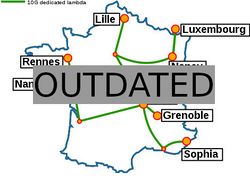Grid5000:Home
|
Grid'5000 is a large-scale and versatile testbed for experiment-driven research in all areas of computer science, with a focus on parallel and distributed computing including Cloud, HPC and Big Data. Key features:
|
Random pick of publications
Five random publications that benefited from Grid'5000 (at least 2937 overall):
- Romaric Pegdwende Nikiema, Marcello Traiola, Angeliki Kritikakou. Impact of Compiler Optimizations on the Reliability of a RISC-V-based Core. DFT 2024 - 37th IEEE International Symposium on Defect and Fault Tolerance in VLSI and Nanotechnology Systems, Oct 2024, Oxfordshire, United Kingdom. pp.1-1. hal-04731794 view on HAL pdf
- Can Cui, Imran Ahamad Sheikh, Mostafa Sadeghi, Emmanuel Vincent. Improving Speaker Assignment in Speaker-Attributed ASR for Real Meeting Applications. The Speaker and Language Recognition Workshop Odyssey 2024, Jun 2024, Quebec, Canada. hal-04495886v2 view on HAL pdf
- François Lemaire, Louis Roussel. Parameter Estimation using Integral Equations. Maple Transactions, 2024, Proceedings of the Maple Conference 2023, 4 (1), 10.5206/mt.v4i1.17126. hal-04560846v2 view on HAL pdf
- Danilo Carastan-Santos, Georges da Costa, Igor Fontana de Nardin, Millian Poquet, Krzysztof Rzadca, et al.. Scheduling with lightweight predictions in power-constrained HPC platforms. IEEE Transactions on Parallel and Distributed Systems, 2025, pp.1-12. 10.1109/TPDS.2025.3586723. hal-04747713v3 view on HAL pdf
- Emmanuel Medernach, Gaël Vila, Axel Bonnet, Sorina Camarasu-Pop. ReproVIP Report #2.1.1 Application Deployment Strategies. CREATIS Université Lyon 1. 2024. hal-04551771 view on HAL pdf
Latest news
Failed to load RSS feed from https://www.grid5000.fr/mediawiki/index.php?title=News&action=feed&feed=atom: Error parsing XML for RSS
Grid'5000 sites
Current funding
As from June 2008, Inria is the main contributor to Grid'5000 funding.
INRIA |
CNRS |
UniversitiesUniversité Grenoble Alpes, Grenoble INP |
Regional councilsAquitaine |


